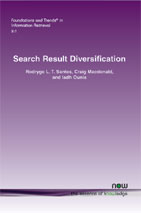Search Result Diversification
By Rodrygo L. T. Santos, Universidade Federal de Minas Gerais, Brazil, rodrygo@dcc.ufmg.br | Craig Macdonald, University of Glasgow, United Kingdom, craig.macdonald@glasgow.ac.uk | Iadh Ounis, University of Glasgow, United Kingdom, iadh.ounis@glasgow.ac.uk
Abstract
Ranking in information retrieval has been traditionally approached as a pursuit of relevant information, under the assumption that the users’ information needs are unambiguously conveyed by their submitted queries. Nevertheless, as an inherently limited representation of a more complex information need, every query can arguably be considered ambiguous to some extent. In order to tackle query ambiguity, search result diversification approaches have recently been proposed to produce rankings aimed to satisfy the multiple possible information needs underlying a query. In this survey, we review the published literature on search result diversification. In particular, we discuss the motivations for diversifying the search results for an ambiguous query and provide a formal definition of the search result diversification problem. In addition, we describe the most successful approaches in the literature for producing and evaluating diversity in multiple search domains. Finally, we also discuss recent advances as well as open research directions in the field of search result diversification.
Search Result Diversification
Ranking in information retrieval has been traditionally approached as a pursuit of relevant information, under the assumption that the users’ information needs are unambiguously conveyed by their submitted queries. Nevertheless, as an inherently limited representation of a more complex information need, every query can arguably be considered ambiguous to some extent. In order to tackle query ambiguity, search result diversification approaches have recently been proposed to produce rankings aimed to satisfy the multiple possible information needs underlying a query.
This primer on the topic reviews the published literature on search result diversification. In particular, it discusses the motivations for diversifying the search results for an ambiguous query and provides a formal definition of the search result diversification problem. In addition, Search Result Diversification describes the most successful approaches in the literature for producing and evaluating diversity in multiple search domains. Finally, it also discusses recent advances as well as open research directions in the field of search result diversification.
